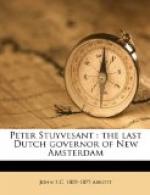“When these colonies once become permanently established, when the ships of New Netherland ride on every part of the ocean, then numbers, now looking to that coast with eager eyes, shall be allured to embark for your island.”
This prophecy is now emphatically fulfilled when often one or two thousand emigrants, from the old world, land at the Battery in a day. When the prophecy was uttered, New Amsterdam was a small straggling village of one story huts, containing about seven hundred inhabitants. The whole island of Manhattan belonged in fee to the West India Company. A municipal government was soon organized, which about the year 1653, gave birth to the city of New Amsterdam.
Holland and England were now in open and deadly warfare. It will hardly be denied by any one, that England was responsible for the conflict. The New England colonies wished to avail themselves of the opportunity to wrest New Netherland from the Dutch, and to extend their sway from Stamford to the Chesapeake. Governor Stuyvesant perceived his danger. He could be easily overpowered by the New England colonies. He wrote very friendly letters to the governors, urging that, notwithstanding the hostilities between the mother-countries, commercial intercourse between the colonies should continue on its former peaceful footing. At the same time he adopted very vigorous measures to be prepared for defence should he be assailed.
Rumors reached New Amsterdam of active military preparations in progress in New England. It was manifest that some hostile expedition was contemplated. Fort Amsterdam was repaired. The city was enclosed by a ditch and palisade, with a breastwork extending from the East river to the North river. The whole body of citizens mounted guard every night. A frigate in the harbor was ready at any moment to spread its sails, and its “guns were kept loaded day and night.” The citizens without exception, were ordered to work upon the defences, under penalty of fine, loss of citizenship and banishment.
Thus barbaric war came again to mar all the prosperity of the colony, and to undermine all its foundations of growth and happiness. The Mohican Indians, on the east side of the North river, and whose territory extended to the Connecticut, were allies of the English. Uncas, the chief of this tribe, declared that Governor Stuyvesant was plotting to arm the Narragansetts against New England. At the same time nine chiefs from the vicinity of Manhattan, sent a messenger to Stamford, who said:
“The Dutch governor has earnestly solicited the Indians in these parts, to kill all the English. But we have all refused to be hired by him, for the English have done us no harm.”
The New England colonists were by no means satisfied that these charges were true. Veracity was not an Indian virtue. Cunning was a prominent trait in their character. An extraordinary meeting of commissioners was held in Boston, in April, 1653. Two messengers had been previously sent by the Massachusetts council, to interrogate three of the principal Narragansett chiefs, respecting the conduct of Governor Stuyvesant. They reported at the meeting, that the Narragansett chiefs utterly denied that Governor Stuyvesant had ever approached them with any such proposition. One of them, Ninigret, said:




